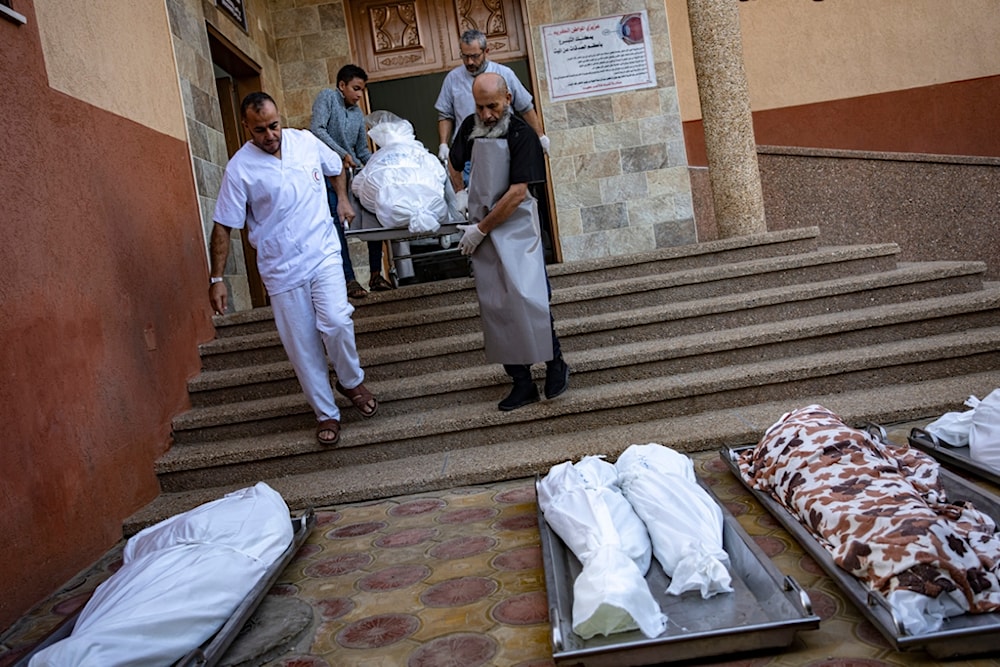WHO dubs Gaza hospitals 'horror movie' even before resumed aggression
WHO senior emergency officer Rob Holden, who is located in the besieged Gaza Strip, says "bombs have got to stop," considering the horrific scenes of hospitals.
-

Palestinians mourn their relatives killed in the Israeli occupation massacres, in the hospital in Khan Younis, Gaza Strip, Saturday, Dec. 2, 2023. (AP)
The World Health Organization announced that hospitals in the Gaza Strip, even before the resumption of the Israeli occupation massacres, were "catastrophic" and resembled a "horror movie".
Richard Peeperkorn, WHO's representative in occupied Palestine, according to an AFP report, said, "We are extremely concerned about the resumption of violence," adding that "the health system in Gaza has been crippled by the ongoing hostilities."
According to Peeperkorn, the health system in Gaza "cannot afford to lose more hospitals," noting that only 18 out of the 36 hospitals in the Strip are currently operating, with only three hospitals in the north that are barely operative.
The representative also stressed that the south had 12 partially functional yet "extremely overwhelmed" hospitals, meaning that they have exceeded their capacity two to three times over.
In that context, Peeperkorn stressed that there was an "urgent need" for a consistent supply of aid "to keep them functional," since all the hospitals were experiencing shortages of food, fuel, supplies, and even water.
Moreover, at least 5,000 hospital beds were much needed given the skyrocketing needs of the besieged population.
On his part, a WHO senior emergency officer, Rob Holden, stated that the "healthcare service is on its knees" and that the scene at the relatively small hospital of Al-Ahli, in the north, that suddenly found itself to be the only hospital receiving trauma patients, is "like a horror movie."
Holden, who is located in the Strip, described the situation in Al-Ahli Hospital following his visit. He said patients covered the floor "with the most traumatic injuries that you can imagine," adding that "there is no standing room. The floor is just awash with blood and patients lying waiting to receive life-saving care."
After the war resumed, Holden said he thought of the physicians he had been interacting with over the past several days, as they were set to deal with "the most horrific scene, as casualties probably in their tens if not hundreds turn up at that hospital today, knowing that they will do everything they can, but knowing that it will not be enough."
"The bombs have got to stop," said Holden.
UNRWA warns of Hepatitis A outbreak in Gaza amid Israeli aggression
Thomas White, the director of UNRWA affairs in Gaza, has issued a warning about the escalating Hepatitis A outbreak in the region, emphasizing the overwhelming challenges faced by UNRWA schools-turned-shelters due to the extensive displacement in the southern areas.
"At one of our schools, we've now had an outbreak of Hepatitis A," he said.
In an interview for the BBC, White acknowledged the significant difficulties in maintaining sanitation within the shelters, where people are densely packed into classrooms, with an average of 150 individuals sharing a single bathroom.
He tersely stated, "The risk of the disease is very present in Gaza at the present time."
Elsewhere in his remarks, the Director of UNRWA Affairs in Gaza emphasized that the prevalent risk of disease in Gaza is heightened by the fact that UNRWA schools, initially designed to accommodate 1,500 people, are currently hosting over 6,000 individuals in the southern region.
Read more: Experts say 'Israel' doing little to avoid civilians casualties

 3 Min Read
3 Min Read








